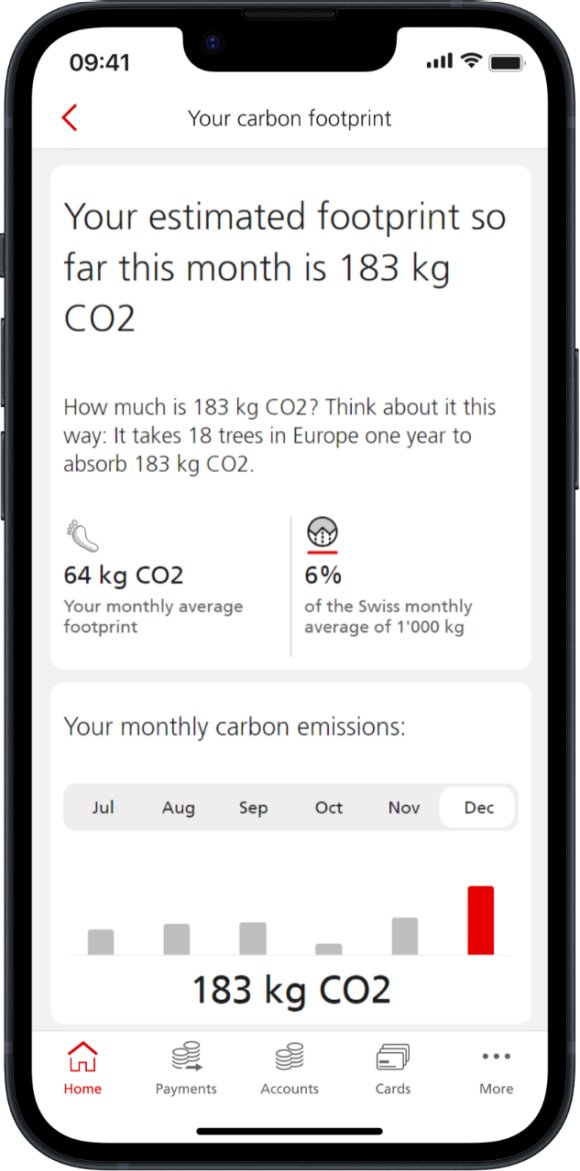Introduction
The climate crisis is one of the greatest challenges the world faces today. We believe that governments, businesses and individuals need to work together to tackle this challenge. The carbon footprint tracker makes it easier for you to understand the impact of your actions.
In a nutshell
What is a carbon footprint?
A carbon footprint is the sum of all the greenhouse gas emissions that are needed to produce a product or to use a service. It is expressed in carbon dioxide equivalents, CO2e. To keep it simple, we’ll be using the term carbon footprint.
Why is the carbon footprint useful?
The carbon footprint is a tool to help you understand the impact of your actions on the environment: where you eat, how you travel, where you shop. It provides you with a simple way to track, measure and manage the impact of your carbon emissions.
Calculating an accurate carbon footprint is complicated: A product is produced, transported, distributed and sold. A service is prepared and undertaken. Each of these steps involves carbon emissions. The high level of complexity means that it is never possible to calculate a completely accurate footprint.
The good news is, having a general idea of your carbon footprint is enough to be mindful of your consumption choices. Our goal with the carbon footprint tracker is more about helping you understand the big picture. Similarly, you can think about the following question: is an apple or chocolate bar healthier? Most of us know an apple is healthier, but don’t know why exactly his is the case i.e. which macro and micro nutrients make the apple healthier. But we understand the big picture and make informed decisions.
How do we estimate your carbon footprint?
Your purchases
Emission factor per merchant category
Estimated carbon footprint
Payment of 80 CHF
Grocery store emission factor of 0.3 kg CO2e/ CHF
Estimated carbon footprint of 24kg
- Each payment is assigned to a merchant category.
- Each merchant category has an emission factor that indicates its carbon intensity per Swiss franc.
- The carbon footprint is the result of multiplying the emission factor with the payment amount.
How is your personal data processed?
Reducing the carbon footprint
How can you reduce your footprint?
Together with our partners, myclimate and MYBLUEPLANET, we have put together some tips and tricks on how you can reduce your carbon footprint. There are many ways in which you can reduce it and help the environment; whether you’re at home, work, or you’re travelling, small changes can make a difference.
What are we doing to reduce our footprint?
We’re committed to doing our part, from addressing our own emissions to those of our business activities and supply chain.
Reducing our own emissions
We are working to minimize our own operational footprint. For example, we are reducing our emissions through energy efficiencies in our buildings and by switching to more sustainable energy sources, across the combined firm.
If you would like to learn more about our strategy for sustainability and impact as well as our successes over the past year, please see our 2024 Sustainability Report.
As a financial service provider
We all know finance has a powerful influence on the world. At UBS, we reimagine the power of people and capital, to create a better world for everyone. Hence our ambition is to be the financial provider of choice for clients who wish to mobilize capital toward the achievement of the United Nations’ 17 Sustainable Development Goals (the SDGs) and the orderly transition to a low-carbon economy.
For this transition, we have defined principles in our company’s policies. These principles are applied to all our activities, including granting loans.
Examples of our principles and activities include:
No financing of new coal-fired power plant projects, new offshore oil projects in the Arctic. Greenfield thermal coal mines or greenfield oil sands projects
Energy efficient real-estate New financing solutions launched in Switzerland to encourage clients to invest in more sustainable energy and heating systems
USD 292 billion reached in our sustainable investing assets under management
Partnership with two pioneering Swiss companies – Neustark and Climeworks – established in 2022 to remove 39,500 tones of CO2 from the atmosphere over the next 13 years.
Launched Carbonplace together with other banks. A platform that connects buyers and sellers of carbon credits.
The UBS Sustainability and Impact Institute contributes to debates about sustainability, with a focus on actionable and timely contribution.
Deep Dive
Carbon footprint
The methodology
Managing your sustainability insights in Mobile Banking
Data privacy
Disclaimer
Disclaimer




